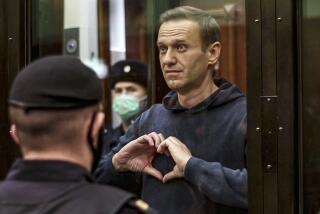Chasing the king of chess
Like a lot of kids in the summer of 1972, I was riveted by a strange spectacle unfolding in Iceland: a chess match between Soviet grandmaster Boris Spassky and Bobby Fischer, the mercurial young American.
The games weren’t televised -- Fischer permitted no cameras -- so chess experts replayed the moves on public television using oversize boards. Through long summer days, I puzzled over poisoned pawns and bishop pairs as Fischer, after nearly walking out on the match, crushed the Russian champion.
Through solitary study and determination, Fischer had toppled a Soviet chess establishment that had every advantage: better coaching, state stipends, access to the latest games and opening theory.
I got caught up in the chess mania that swept the country after Fischer’s victory. The craze quickly faded, but my fascination with Bobby never did.
Over the years, I read everything I could find about him, replayed his most famous games and talked with friends of his who frequented the Marshall Chess Club in New York, scene of some of his triumphs.
In time, my interest shifted from Fischer’s chess to a much murkier aspect of his life: the identity of his father.
Bobby’s life story, like his behavior, was bizarre and complicated. At the height of his powers, he abandoned the game and went into seclusion, surfacing periodically to spout paranoid, anti-Semitic screeds and to denounce the United States. He died last year at 64 in Iceland, the only country that would have him.
It seemed to me that if I was to get a better grasp of this elusive figure, I needed to know more about his origins.
Bobby was born in Chicago and raised in Brooklyn by a single mother, Regina Fischer. She told people his father was a German biophysicist named Gerhardt Fischer. The couple divorced when Bobby was a toddler. That’s about all that was known.
The dearth of details about Gerhardt and his role in Bobby’s life whetted my curiosity. What was he like? Did he share his son’s intellectual gifts? What kind of relationship did they have?
My wife, fellow journalist Clea Benson, came to share my interest, and before long it morphed into something of an obsession.
We became part of a subculture in which Fischer fanatics dissect his old games like sacred scrolls, pay tens of thousands of dollars for his old notebooks and argue ceaselessly about whether later champions could have held their own against him.
In search of Fischer arcana, we’ve been to the Chess Hall of Fame in Miami, whose dominant architectural feature is an oversize rook. We’ve pored over records at the New York Public Library. We’ve hired Hungarian translators and sifted through 70-year-old letters stored at the National Archives in Maryland.
In 2002, I even made a pilgrimage to Reykjavik to see the chess board where Fischer and Spassky squared off 30 years before.
That same year, I resolved to get more serious about my research on Gerhardt. Enough amateur sleuthing. Now I would use my reportorial skills to gather every available fact about the man.
FBI dossiers are often a rich source of information. I thought it unlikely the bureau had a file on Gerhardt, but Regina was well-known in her day. Whatever information the FBI had collected about her might shed light on him. I requested the file under the Freedom of Information Act.
A few months later, it arrived in the mail -- 900 heavily redacted pages reflecting the ideological phobias of a bygone era.
Regina was a European Jew who immigrated to the U.S. as a child, traveled widely and earned nursing and medical degrees. She married Gerhardt in Moscow in 1933, and the couple lived there for several years.
She returned to the U.S. at the outset of World War II. The FBI, suspecting she was a Soviet agent, read her mail and tracked her movements for years. (In the end, agents concluded she was not a spy.)
The file has little to say about Gerhardt. But its pages are crammed with details about a man Clea and I had never heard of: Paul Felix Nemenyi.
Born to a prominent Jewish family in Hungary in 1895, he was brilliant. At 17, he was co-winner of a national math and physics competition. He had a special gift for spatial relations -- a skill important to chess players. In the 1920s, he became a university lecturer in Berlin.
Nemenyi lost his position in 1933, when “non-Aryans” were purged from German universities. He settled in the U.S., and in 1942 he was teaching at what was then Colorado State College in Fort Collins. Regina was studying at the University of Denver.
They appear to have met and had an affair. Gerhardt, unable to obtain a visa to enter the U.S., was in Chile at the time, according to the FBI file.
In 1943, Regina moved to Chicago, alone. Bobby was born there in March of that year. His birth certificate lists Gerhardt as the father. FBI agents doubted that was possible, since their records indicated he had never set foot in the U.S.
Regina herself told conflicting stories about the father’s identity. She was itinerant, shuttling between jobs and schools all over the country. She would often turn to Jewish social service agencies for advice and financial aid.
From employees at these agencies, the FBI learned that Regina once told a social worker that she hadn’t seen Gerhardt since 1939, four years before Bobby was born. On another occasion, she said Bobby was conceived when she visited Gerhardt in Mexico.
Nemenyi visited some of these same agencies, according to the FBI file. He arranged to pay child support and told social workers he was unhappy with how Regina was raising Bobby. He once grew so upset describing his quarrels with Regina, according to one document, that he began “weeping.”
On the Internet, Clea and I found an obituary of a civil rights activist from North Carolina named Peter Nemenyi -- Paul Nemenyi’s son from an early marriage.
Peter, who died in 2002, was about 15 years older than Bobby and had told friends he was Fischer’s half-brother. He had a doctorate in mathematics from Princeton University and supported himself teaching. Clea ran his name through a database of university archives and discovered that some of his personal papers were at the University of Wisconsin.
An archivist faxed us the file. It contained a letter that Peter wrote after his father died in 1952. Bobby was 9 at the time. Peter was writing to the boy’s psychiatrist for advice. Regina had asked him to break the news of Paul’s death to Bobby, and he wasn’t sure how to do it. He had met Bobby only a couple of times.
“I take it you know that Paul was Bobby’s father,” Peter wrote.
The file also contained a letter to Peter from Regina. She said she was destitute because of Paul’s death -- Paul had been paying for Bobby’s schooling.
Clea and I wrote a story about these discoveries in 2002 for the Philadelphia Inquirer, where we both worked at the time. For a pair of Fischer obsessives, it was a heady feeling. We’d uncovered information that suggested the generally accepted outline of Fischer’s life was wrong in one very important detail: His father was not Gerhardt Fischer, but rather Paul Nemenyi.
If our conclusion held up, it could change the popular understanding of Fischer and the formative influences on him.
Response to our disclosure was mixed. Friends of Bobby were skeptical. Fischer himself did not react publicly from his overseas exile: We sent him letters in Budapest and Tokyo, cities where he had been seen, but got no reply.
In subsequent articles, some writers referred to our findings about Nemenyi as a theory, nothing more.
So we kept at it. Clea went back online and discovered that letters Paul had written to the Hungarian-born engineer Theodore von Karman were stored at Caltech. She contacted the school in 2005 and it sent us copies.
Inside the package we were stunned to find a photograph of Paul Nemenyi -- the first we’d ever seen. He had enclosed it with one of his letters to Von Karman. The resemblance to Bobby was striking: the same deep-set, burning eyes, the same facial structure, even the same unruly shock of hair.
Next, we pulled Nemenyi’s probate file from court archives in Washington, D.C., where he died. It contained a petition by the executor of Nemenyi’s estate -- a lawyer hired by his son Peter -- stating that Bobby had been born to Regina and Nemenyi “out of wedlock.”
Now we felt we had proven the case beyond any doubt. We presented our findings at a Bobby Fischer symposium at the Marshall Chess Club in March. We set up a projector for our PowerPoint slide show on the same chess table where Fischer, in 1965, had played by teletype in a tournament hosted by Cuba.
The audience was polite and largely accepting of our conclusion. But in the wider world, doubts persisted. An online skeptic wrote: “The only way you can really say ‘beyond all doubt’ is by testing the DNA.”
We had another line in the water, however. A few months earlier, we’d realized there was a potential source of information we hadn’t tapped. Perhaps the FBI did have a file on Gerhardt. We sent a request to the bureau just in case.
There was such a file, it turned out, and it arrived in the mail in July. Included was a copy of a letter, dated May 22, 1959, from FBI Director J. Edgar Hoover to his counterpart at the CIA, detailing recent surveillance of Regina and Bobby.
In an aside, Hoover wrote: “It is interesting to note that investigation has established that the father of Robert James Fischer is not [Gerhardt] Fischer as represented by Mrs. Fischer. Investigation has established that Robert James Fischer’s father was one Paul Felix Nemenyi.”
The letter doesn’t say how the FBI reached this conclusion. But it seems likely that agents learned the truth from social service agencies that dealt with Regina and Nemenyi.
Why did Regina maintain the fiction that Gerhardt was the father? Russell Targ of Palo Alto, who was married to her daughter, Joan, for nearly 40 years, thinks Regina wanted to avoid the stigma of an out-of-wedlock birth.
“She wanted to say the man she was married to was the father of the baby,” he said.
Did Bobby know Nemenyi was his father?
Eva Stallings, a close friend of Bobby, offered a clue when I reached her by phone in New York this summer.
In 2004, Bobby was detained by the Japanese for traveling without a valid U.S. passport. The State Department had revoked his passport because of an outstanding arrest warrant. Fischer was wanted on federal charges that he had violated U.S. economic sanctions by traveling to Yugoslavia in 1992 for a rematch with Spassky. He was at risk of being deported to the U.S. and put on trial.
Stallings was among a group of friends who tried to find him a haven in Germany. She told me she drafted a request to the German government for Gerhardt’s birth certificate, hoping it would help Bobby make his case for refuge. When she showed him the letter, he made a telling alteration, she said.
He crossed out a passage that identified Gerhardt as his father, writing instead that Gerhardt was “listed on my U.S. birth certificate as my father.”
Stallings thinks Bobby was signaling that his real father was someone else.
“That’s the conclusion I would draw,” said Stallings, now an employee of the German consulate in New York.
Another close friend says Bobby shared memories of Nemenyi with her.
Zita Rajcsanyi, a Hungarian chess player, gave several interviews to Hungarian journalist Tivadar Farkashazy for a book he published in 2008. Rajcsanyi declined our request for an interview, but told us the book is accurate. We had the relevant parts translated into English.
According to the book, Bobby told her that a man named Paul with a thick Hungarian accent would show up at the Brooklyn apartment he shared with his mother and sister and take him on outings.
Bobby told Rajcsanyi that Paul once took him to a restaurant and scolded him for spreading butter on the outside of the bun rather than the inside -- “as is customary in better cultural circles.”
When Bobby was 9, Nemenyi disappeared from his life. It was only then that Bobby learned the truth, according to the book. He asked his mother why Nemenyi had stopped visiting, and she told him he had died.
“He was your father,” Regina told her son, according to Rajcsanyi. “Didn’t you know?”
How was Bobby affected by the secrecy and the contradictions surrounding his father’s identity? What was it like for him to learn that the man whose name he bore was not his father -- and to find out only after Nemenyi’s death that this mysterious figure with the thick accent was his flesh and blood?
There is no way to know. But these experiences may help explain Fischer’s venomous anti-Semitism and his denial of his own Jewish ancestry.
As a teenager, he told a magazine writer he was Jewish only on his mother’s side. Years later, he wrote to the Encyclopedia Judaica asking that he not be listed as a Jew.
When he returned from his victory in Iceland in 1972, he stayed with his sister and her husband in Palo Alto. Bobby’s anti-Semitic tirades grew so unbearable that Joan kicked him out, Targ recalled.
“It was almost like Tourette’s,” Targ said. “He couldn’t control himself.”
On a Philippine radio show in 1999, Fischer denied the Holocaust and said that he was the victim of a Jewish “conspiracy.”
Such outbursts seem all the more strange in light of how his father’s family suffered under the Nazis. Paul Nemenyi’s mother and brother -- Bobby’s grandmother and uncle -- were held in a concentration camp.
The uncle’s art collection, which included works by Klimt, Kandinsky and Matisse, was stolen and never recovered, according to Hungarian art researchers.
To this day, Fischer exerts a powerful hold on the imagination, despite (or perhaps because of) the tragic arc of his life after Reykjavik.
My wife and I believe there’s more to be learned about Nemenyi’s role in that life. We’re thinking about a trip to Hungary, where he was born. Who knows what we might find?
More to Read
Start your day right
Sign up for Essential California for news, features and recommendations from the L.A. Times and beyond in your inbox six days a week.
You may occasionally receive promotional content from the Los Angeles Times.





